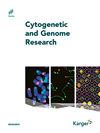Skewed X-Chromosome Inactivation as a Possible Marker of X-Linked CNV in Women with Pregnancy Loss
IF 1.7
4区 生物学
Q4 CELL BIOLOGY
引用次数: 2
Abstract
Skewed X-chromosome inactivation (sXCI) can be a marker of lethal genetic variants on the X chromosome in a woman since sXCI modifies the pathological phenotype. The aim of this study was to search for CNVs in women with miscarriages and sXCI. XCI was assayed using the classical method based on the amplification of highly polymorphic exon 1 of the androgen receptor (AR) gene. The XCI status was analysed in 313 women with pregnancy loss and in 87 spontaneously aborted embryos with 46,XX karyotype, as well as in control groups of 135 women without pregnancy loss and 64 embryos with 46,XX karyotype from induced abortions in women who terminated a normal pregnancy. The frequency of sXCI differed significantly between women with miscarriages and women without pregnancy losses (6.3% and 2.2%, respectively; p = 0.019). To exclude primary causes of sXCI, sequencing of the XIST and XACT genes was performed. The XIST and XACT gene sequencing revealed no known pathogenic variants that could lead to sXCI. Molecular karyotyping was performed using aCGH, followed by verification of X-linked CNVs by RT-PCR and MLPA. Microdeletions at Xp11.23 and Xq24 as well as gains of Xq28 were detected in women with sXCI and pregnancy loss.偏斜X染色体失活作为妊娠丢失妇女X连锁CNV的可能标记
偏斜X染色体失活(sXCI)可能是女性X染色体上致命遗传变异的标志,因为sXCI改变了病理表型。本研究的目的是在流产和sXCI妇女中寻找CNVs。XCI采用基于雄激素受体(AR)基因高度多态性外显子1扩增的经典方法进行测定。对313名流产妇女和87个具有46,XX染色体组型的自然流产胚胎,以及135名未流产妇女和64个终止正常妊娠的人工流产胚胎的对照组进行了XCI状态分析。流产妇女和未流产妇女的sXCI发生率存在显著差异(分别为6.3%和2.2%;p=0.019)。为了排除sXCI的主要原因,对XIST和XACT基因进行了测序。XIST和XACT基因测序未发现可能导致sXCI的已知致病性变体。使用aCGH进行分子核型分析,然后通过RT-PCR和MLPA验证X连接的CNVs。在患有sXCI和妊娠损失的妇女中检测到Xp111.23和Xq24的微缺失以及Xq28的增加。
本文章由计算机程序翻译,如有差异,请以英文原文为准。
求助全文
约1分钟内获得全文
求助全文
来源期刊

Cytogenetic and Genome Research
生物-细胞生物学
CiteScore
3.10
自引率
5.90%
发文量
25
审稿时长
1 months
期刊介绍:
During the last decades, ''Cytogenetic and Genome Research'' has been the leading forum for original reports and reviews in human and animal cytogenetics, including molecular, clinical and comparative cytogenetics. In recent years, most of its papers have centered on genome research, including gene cloning and sequencing, gene mapping, gene regulation and expression, cancer genetics, comparative genetics, gene linkage and related areas. The journal also publishes key papers on chromosome aberrations in somatic, meiotic and malignant cells. Its scope has expanded to include studies on invertebrate and plant cytogenetics and genomics. Also featured are the vast majority of the reports of the International Workshops on Human Chromosome Mapping, the reports of international human and animal chromosome nomenclature committees, and proceedings of the American and European cytogenetic conferences and other events. In addition to regular issues, the journal has been publishing since 2002 a series of topical issues on a broad variety of themes from cytogenetic and genome research.
 求助内容:
求助内容: 应助结果提醒方式:
应助结果提醒方式:


